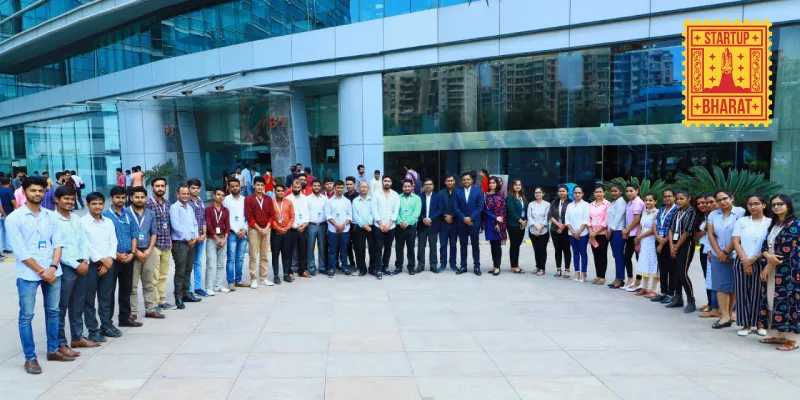[Startup Bharat] Last-mile delivery enterprise 72 Networks reaches 12,000 pin codes in Tier II and III India
Gurugram-based 72 Networks is a pan-India distribution enterprise specialising in last-mile delivery and focusing on consumers in Bharat.
In 2014, Srinivas L, was heading the business development team for Samsung Enterprise Mobility, along with his counterpart Gaurav Ahlawat at Samsung Consumer Electronics, which offered microfinance cross-selling for Samsung.
This worked as a separate business, and involved selling Samsung products on easy weekly instalments. The business beat all forecasts and grew to contribute almost 40 percent of their entire business.
The duo soon realised that there was a huge market, not just for consumer lending but also logistics and delivery.
This led to the birth of 72 Networks, a pan-India distribution enterprise specialising in last-mile delivery with a special focus on rural areas. Based out of Gurugram, 72 Networks is focused on Tier II and III India.

The 72 Networks team is facilitating last-mile deliveries across Bharat.
How does it work?
The platform has two layers. The microfinancing layer focuses on providing consumer durable loans to Tier II and III consumers.
The microfinance company's feet-on-street agents meet consumers and provide them with micro-finance options on their apps. Once the user chooses the product, the agent places the order. Details of the order go to 72 networks who then make the deliveries.
The startup is opening an alternate channel of almost 15 crore consumers for OEMs.
“We have alliances with the country’s top OEMs like Samsung, Nokia, Xioami, Maharaja, Singer, and many more,” Srinivas says.
72 Networks has set up a hybrid network of central hubs and rural distribution trust points run by village-level entrepreneurs for local deliveries.
This infrastructure is supported by a strong, home-grown supply chain platform that supports intelligent decision-making for order processing, route optimisation, and digital proof of delivery.
Together, they form a fully traceable last-mile delivery system, which helps 72 Networks maintain turnaround time (TAT) for even the remotest part of the country for home delivery of large and small appliances.
At the other end of the spectrum, 72 Networks is taking the cross-selling business as an additional channel of financing for MFIs.
Adding the logistics layer
72 Networks is at present actively servicing clients of BFIL, Fullerton, Fusion, Spandana, and many others.
“We don’t just play aggregator between micro-finance institutions (MFIs) and OEMs; we also facilitate lifestyle aspirations of people living in rural India,” Srinivas says.
Initially, the business model involved getting orders from MFI customers and getting items delivered to branches of the MFI companies.
“It was a business that had very few operational expenses. But eventually, due to regulatory issues, deliveries started to get shifted from branches to customer’s doorsteps. This was a huge logistical nightmare for partners, who had a tough time getting to the customer doorsteps as they were in remote and rural locations,” Srinivas says.
The founders began research and travelled across the country to assess and formalise the best possible way to achieve this. The team decided to set up a technology-based infrastructure capacity that strives for last-mile delivery within 72 hours.
72 Networks is currently operational in 14 states. The enterprise has 46 fully dedicated and functional warehouses across India.
The team and growth
The duo established 72 Networks with a third founder, Gagan Chadha who has a keen eye on identifying and investing in high potential startups. They connected with other ex colleagues and friends who managed supply chain and logistics for large consumer durable companies, and brought them on board.
The core team now comprises 10 members, and the employee strength is over 200 people.
The startup has a route planning system that can trace product deliveries within 72 hours. It has a “No Out of Delivery Area (ODA) Concept” to deliver to every pin code in the 14 states it operates in, across the more than 56 warehouses.
To date, the company has made about 2.5 lakh individual rural deliveries in almost 12,000 pin codes.
Srinivas says 72 Networks not only delivers products across the most remote parts of India, but is “also responsible for employment generation”.
“Over 300 bikers in the hinterlands of the country are a part of the 72 Networks family. Higher paying jobs ensure a more stable income for the community and better quality of life,” he says.
The market and need
Srinivas feels that microfinance, as an industry, has rapidly expanded over the last few years, providing financial access to a very large rural population till now excluded from the country’s financial system.
This segment has, with the help of micro credit, been able to generate a steady residual income that has led to an improvement in their lifestyle and fulfilment of aspirational needs.
The rural populace has emerged as a new market for manufacturers of consumer durables and electronics, with rural consumption gradually overtaking urban consumption.
But logistics and costs have always been a challenge when it comes to on-time, last-mile delivery. 72 Networks aims to change this, and believes that there’s a huge market.
Revenue and the future
A new breed of ecommerce startups - from , LaYuva, , , , , and to Ezmall Zepo, , and - are helping small sellers ride India’s ecommerce wave by providing easy backend solutions.
Other startups like and are focused on reaching consumers in this market.
Currently bootstrapped, 72 Networks believes it has already made significant inroads. In FY19, it closed with a positive topline of Rs 70 crore, and reached a topline of Rs 100 crore in the third quarter of FY20.
The startup is now aiming for robust growth.
“72 Networks is excited to get into the next business growth phase, which is to use technology - primarily AI - as a tool to drive businesses and achieve higher profitability. We want Rs 200 crore of business in FY20.”
“Our vision is to reach every rural household by 2022, with a footprint of almost 2.5 lakh rural distribution networks across the country, and a topline of Rs 1,000 crore,” Srinivas says.
(Edited by Teja Lele Desai)


![[Startup Bharat] Last-mile delivery enterprise 72 Networks reaches 12,000 pin codes in Tier II and III India](https://images.yourstory.com/cs/2/a9efa9c02dd911e9adc52d913c55075e/yourstorySB-1582021328489.png?mode=crop&crop=faces&ar=2%3A1&format=auto&w=1920&q=75)

![[Startup Bharat] Gangtok-based educational travel startup Invacations aims for ‘inclusive India'](https://images.yourstory.com/cs/2/3fb20ae02dc911e9af58c17e6cc3d915/2-1581488009933.png?fm=png&auto=format&h=100&w=100&crop=entropy&fit=crop)





